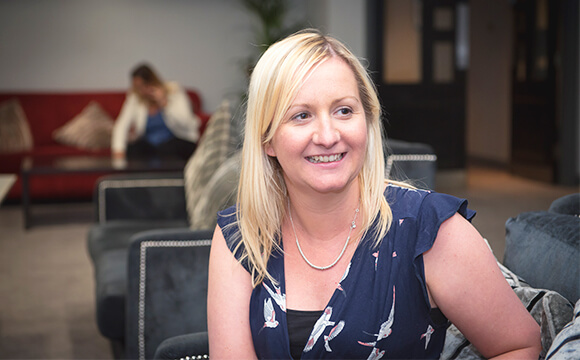International Women’s Day | Let’s #InspireInclusion

In our conversation with Michelle Hobson, Moorepay’s HR Services Director, we delve into the barriers women face in leadership. As we celebrate International Women’s Day, Michelle shares insights on championing diversity and working towards a better, more inclusive workplace.
What’s the main barrier between women and senior leadership?
I think as a society we have made positive improvements and some aspects of gender inequality have been stamped out, for the most part. For example, inappropriate behaviour towards women in the workplace, although unfortunately can still happen, it is much more openly condemned and deemed unacceptable. However, I think despite progress in some areas, there’s still quite a way to go.
Have you had to break any biases in your own career?
The turning point for me in realising the impact of biases towards being a female was when coming back from my first maternity leave, a number of years ago. Whilst I did have many supportive people around me in work and at home, there seemed to be an unwritten rule that it was going to be more difficult for me to do my job now that I was a mother, and that it would have a knock-on effect on my work. That I had to prove my worth even more.
The truth is becoming a parent is going to hugely affect your life, but the effect for me as a female meant that in some ways I didn’t feel comfortable being open and honest about my personal responsibilities. I worked even harder to try and prove that I could do both. And tried to show that when I walked through the office door my responsibilities outside of work didn’t matter, or they were all “under control”.
I have even had comments such as “oh you’re a part timer” if I dropped my child off at nursery/school before work, meaning I was in work slightly later, or if I left early to deal with an emergency. Aside from anything else, why is the term part timer being used as a derogatory term? And even if I was part time, how would that impact my ability to perform well in my job!
Has being a woman ever held you back from leadership in the past?
I feel my personal responsibilities as a mother have impacted my career trajectory at times. I was once prevented from applying for a promotion due to conflicts around working hours and I felt I was being forced to choose between home and work. It shouldn’t have to come to that and for me, it’s hard not to attribute some of the challenges I’ve faced to being both a woman and a Mum.
Times have changed for the better. In some ways, Covid has broken down a few barriers and I am glad it has. The boundaries between work and home life have become blurred, and people’s home life has been laid bare for both men, women, and non-binary people, which has in a way helped.
Now I feel I don’t have to hide my responsibilities and although the balance between home and work sometimes tips one way or the other, I believe I can confidently show how I can more than adequately manage them both, regardless of gender. I hope I’ve been able to lead by example and pass on these values to my team.
What challenges have you faced since becoming a leader?
From a leadership perspective, I’ve noticed some people seem to think I was given a “helping hand” in becoming a leader purely because I am female. It feels like people think you’re there to fill in a quota, and not that you’re there due to your own hard work and determination.
This is not necessarily an attitude within Moorepay – I certainly don’t think my manager or team feels that way, I feel very supported – but more the people you come across in society when you talk about the work you do. Interestingly though bias opinions don’t always come from just males. For instance, I have had females act surprised when I talk about being in a position of leadership or make assumptions about the dynamics in my family. I think unconscious biases are quite deep rooted in society.
Things have changed since I started my first job whilst at university. I am glad to say we are in some ways worlds apart – but we’re still not where we need to be when it comes to breaking unconscious bias.
Why are terms like SHEO and girl boss unhelpful?
I’ve not often experienced these terms myself, but following a promotion I received one once: I remember someone stating that I was “increasing the girl power” in leadership. At the time it wasn’t meant to be offensive, in fact I think it was supposed to be complimentary, but I found it quite patronising.
It’s kind of saying “I’ll always see you as a woman, before I see you as a leader.” Like I was “filling the quota” of women in the leadership team, but to me it’s irrelevant whether I’m a man or a woman when I do my job. And that’s where I think there’s still a lot of work to do in terms of gender equality: education around how we talk to each other and how we accidentally communicate in a way that perpetuates stereotypes and biases.
Why are women ‘bossy’ while men are ‘showing leadership potential’?
There are some double standards when it comes to how men and women in leadership are treated, and as a woman there are times when you feel you must justify your place on a leadership team. When women are more authoritative or assertive, it can come across as bossy, whereas when a man is, people see him as being a true leader and someone with direction and focus.
But on the other hand, when women are more thoughtful and reflective, like my own style of leadership, colleagues think they have to be extra gentle around you, or think that you can’t make decisions, which just isn’t true. In that category, you feel you have to do even more to justify why you’re a leader. I also don’t think men who have this leadership style have to justify their existence as much. Sometimes really, you can’t win!
I do feel that Psychometric testing is so important in leadership teams to create the right dynamics and bring different perspectives to the table. Society is starting to see and appreciate that different people can bring different things to leadership, and that the “feeling and thinking” side for example is just as important as the “action and doing” side, no matter what your gender is.
Do you think companies should look to break the bias for other marginalised groups of people in leadership?
Yes, definitely. Although we’re talking about biases against women on International Women’s Day, there are a lot more biases out there for different groups of people, and it’s important to acknowledge that each group is at different stages in terms of progress and moving to eradicating these biases.
Representation on a leadership level is so important – and even the layers below. The more diverse a leadership team is, the better the business will be.
Speaking for myself though, I wouldn’t want to feel like I got this job just because I’m a woman and I was there to fill a diversity quota. There’s a balance to be struck between making sure you’ve got the right representation and avoiding “tokenism”. That’s not to say encouraging diversity cannot achieve great results.
I think encouraging, creating and maintaining a diverse workforce involves lots of different elements. There is not one magic solution, however it’s important to start at recruitment level: where you do your recruitment and what pool of candidates you’re tapping into. When you’ve got a wider group of candidates to choose from to select the right person for the job, you will hopefully achieve wider diversity. But that has to come alongside a wider drive from the business on diversity, equality and inclusion. And there is still work to do.
However, the chance to highlight biases for Women on International Women’s Day is for me a great step in the right direction. Education and awareness is a key element of impacting change.
Learn more about International Women’s Day
In 2022, we celebrated International Women’s Day with this video on how employers can support women’s careers. Watch it below.




